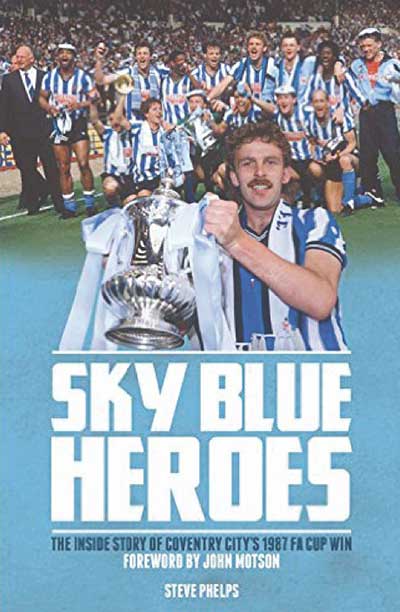 The inside story of Coventry City’s 1987 FA Cup win
The inside story of Coventry City’s 1987 FA Cup win
by Steve Phelps
Pitch Publishing, £18.99
Reviewed by Ed Wilson
From WSC 347 January 2016
For the relative newcomer to football, the fact of Coventry City’s victory in the 1987 FA Cup final, 3-2 against Spurs in one of the most dramatic games in the history of the competition, may come as a surprise. The longer the club spend in the lower reaches of the League, the more improbable the event seems. For success-starved fans, it has acquired quasi-mythical status, conferring a credibility and pride that the club’s current incarnation fails to provide. In Sky Blue Heroes, Steve Phelps offers a hit of nostalgia for those who witnessed this story unfold, and a detailed account of the triumph for those too young to remember it.
Unlike many authors offering accounts of historic seasons, Phelps does not connect his personal life to the travails of the team; victory in the final does not provide cathartic release for the failure of a marriage, or the death of a beloved family pet. Instead, the story is told through a multitude of voices – players, supporters and media – with little mediation between speaker and reader. The approach is refreshingly democratic: reflections from the major contributors to success on the pitch sit alongside those of the supporters – the form implies not just a shared celebration of this success, but a shared contribution to it.
Dave Bennett, scorer of a goal in the final and creator of another, is given extensive opportunity to reflect on the significance of his contribution. However, this gets no more importance than the narrative of the supporter whose Goth phase coincides with the beginning of the Cup run, and finds himself superstitiously insisting on going to every match dressed like he was “attending a wake”. The range of experiences captured by Phelps effectively conveys the diverse, eccentric and unlikely community that constitutes a football club.
Occasionally, Phelps is too keen to share the results of his research. For example, midfielder Dean Emerson’s account of the 3-0 third-round win over Bolton – “We played well… It was a comfortable victory for us” – adds little to the story. However, the inclusion of the players’ accounts also highlights the comically formal vocabulary that footballers employ when addressing the media. The most jarring comes from the utility player David Phillips, who attempts to convince us that his response to manager John Sillett’s request for him to operate in an unfamiliar position was: “I’ll do anything on the field of play for you and the team.” The fact that the conversation with Sillett took place in a toilet doesn’t appear to have stopped him from speaking like Roy Race addressing a Rotary Club dinner.
However, these awkward reflections are more than offset by the unusual stories that Phelps has located beyond the conventional Cup narrative. Despite their long-term top division status, in 1987 Coventry were a relatively small club. As a consequence, unexpected obligations are tackled with a homespun enthusiasm that results in the first-team squad recording the Cup final song in the sitting room of its writers and producers.
Coventry City are a smaller club now than they were at the time of their greatest success. As a result, it seems unlikely that Phelps’s book will find favour among many general readers. However, for those with a stake in the club, Sky Blues Heroes is a comprehensive celebration of a time of success and optimism that is almost inconceivable now.